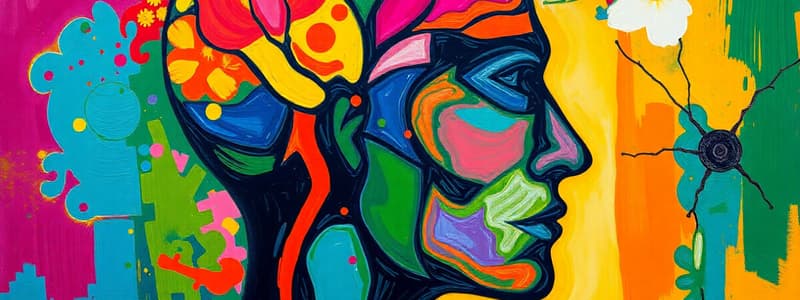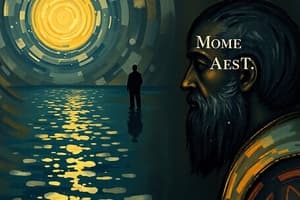Podcast
Questions and Answers
What can the Self or identity be more accurately depicted as?
What can the Self or identity be more accurately depicted as?
- A social construct
- An absolute truth
- A single factor
- A multidimensional aspect (correct)
The self cannot be represented by a certain trait.
The self cannot be represented by a certain trait.
True (A)
Match the following influences on identity with their categories:
Match the following influences on identity with their categories:
Family = Nurture Peer Groups = Nurture Organizations = Nurture Significant people = Nurture
What is meant by 'Nature' in the context of self?
What is meant by 'Nature' in the context of self?
Define 'Identity'.
Define 'Identity'.
Define 'Self'.
Define 'Self'.
What is heredity?
What is heredity?
Socrates wrote down all his ideas.
Socrates wrote down all his ideas.
What did Socrates believe about the self?
What did Socrates believe about the self?
Flashcards
Multidimensional Self
Multidimensional Self
The self is comprised of multiple aspects and is influenced by various factors
Nature vs. Nurture
Nature vs. Nurture
Debate on whether the self is primarily determined by inborn traits (nature) or by environmental influences (nurture).
Social Factors
Social Factors
Influences on the self from significant people like family, peers, and organizations.
Environmental Factors
Environmental Factors
Signup and view all the flashcards
Heredity
Heredity
Signup and view all the flashcards
Person-volition factor
Person-volition factor
Signup and view all the flashcards
Philosophy of the Self
Philosophy of the Self
Signup and view all the flashcards
Identity
Identity
Signup and view all the flashcards
Socrates
Socrates
Signup and view all the flashcards
Self
Self
Signup and view all the flashcards
Study Notes
Understanding the Self
- The self or identity can be multidimensional.
- Many scholars across disciplines and generations have attempted to explain the self.
- Nature vs. nurture: Nature refers to the structural and functional study of the self at various physiological levels, while nurture highlights the influence of social factors on the self.
- Identity is what makes a person or group unique.
- Self is the entirety of an individual.
- Social factors shaping identity include family, peer groups, organizations, and significant others.
- Environmental factors refer to the surrounding physical and communal elements.
- Heredity involves traits passed down from one generation to another.
Philosophical Views on the Self
- Socrates: Knowledge leads to virtue and happiness, believing the real self is the soul.
- Plato: The soul is superior to the physical body, positing an intellectual view of self.
- Aristotle: Empiricist and Aristotelian who believed that essence is within the phenomena, and that matter and essence rely on one another.
- Descartes believes that the mind and soul can exist without the body and soul.
- Locke believed that the soul may change, but consciousness remains intact.
- Hume emphasized that there is no permanent self; it's a bundle of perceptions.
- Kant believed the self constructs knowledge and experience.
- St. Augustine linked knowledge to God.
- Neoplatonism is focused on knowledge that leads to God.
Modern Times Views on the Self
- Ryle's empiricism states that the mind isn't a separate entity and is a category mistake.
- Churchland's neurophilosophy suggests the brain forms the self, and neuroscience will eliminate the need for beliefs.
- Merleau-Ponty's existentialism emphasizes the body's role in defining the self.
Week 5: The Self During the Pandemic
- Stressors can affect physical, emotional, and psychological self.
- Anxiety can manifest in various symptoms (e.g., low mood, decreased energy).
Week 6: The Physical Self
- Heredity, environment, and maturation shape the physical self.
Week 7: The Sexual Self - Part 1
- Heredity transmits traits from parents to offspring.
- Genotype refers to the DNA sequence, while phenotype is its expression.
- Sexual self-concept involves cognitive, affective, interpersonal, behavioral, and physiological aspects of sexuality.
Week 7: The Sexual Self - Part 2
- Sexual preference concerns a person's attraction.
- Gender identity represents one's internal sense of gender, often distinct from sex assigned at birth.
- Sexual expression encompasses how a person embodies their identity.
Week 8: The Cultural Self
- Cultural memberships significantly influence an individual's belief systems, values, and behavior.
- Ecological systems theory describes relationships between people and their environments (microsystems, mesosystems, exosystems, macrosystems).
Week 8: The Digital Self
- Digital identity refers to a person's online persona.
- Digital inhibition is a phenomenon where people behave differently online than in person.
- Dissociative anonymity is when people hide some of their identity in virtual interactions.
Week 9: The Mental Self
- We are born with innate cognitive abilities to handle our environment.
- Memory encompasses sensory, short-term, and long-term levels.
- Intelligence is the ability to understand and deal with the environment.
Week 9: The Emotional Self
- Emotion influences one's ability to perform well.
- Emotion is important for coping with challenges and can be understood.
Week 10-11: The Spiritual Self
- Spirituality reflects meaning and purpose beyond the physical.
- Religion involves faith and belief systems.
- Parapsychology studies paranormal phenomena like extra sensory perception and psychokinesis.
Week 12: The Political Self
- Politics involves power dynamics.
- Active citizenship involves cognitive and behavioral engagement to participate in activities.
- Diversity is key, and recognizes differences based on various factors.
Week 13: The Future Self
- Understanding the future self involves factors like situation, goals, and self-image.
Studying That Suits You
Use AI to generate personalized quizzes and flashcards to suit your learning preferences.




